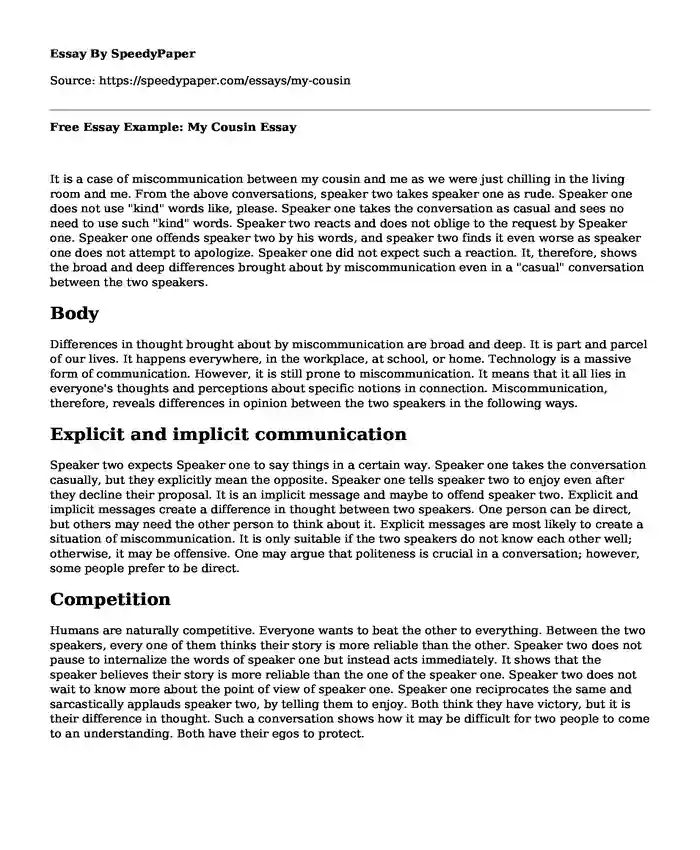
| Type of paper: | Course work |
| Categories: | Analysis Relationship Interpersonal communication |
| Pages: | 2 |
| Wordcount: | 547 words |
It is a case of miscommunication between my cousin and me as we were just chilling in the living room and me. From the above conversations, speaker two takes speaker one as rude. Speaker one does not use "kind" words like, please. Speaker one takes the conversation as casual and sees no need to use such "kind" words. Speaker two reacts and does not oblige to the request by Speaker one. Speaker one offends speaker two by his words, and speaker two finds it even worse as speaker one does not attempt to apologize. Speaker one did not expect such a reaction. It, therefore, shows the broad and deep differences brought about by miscommunication even in a "casual" conversation between the two speakers.
Body
Differences in thought brought about by miscommunication are broad and deep. It is part and parcel of our lives. It happens everywhere, in the workplace, at school, or home. Technology is a massive form of communication. However, it is still prone to miscommunication. It means that it all lies in everyone's thoughts and perceptions about specific notions in connection. Miscommunication, therefore, reveals differences in opinion between the two speakers in the following ways.
Explicit and implicit communication
Speaker two expects Speaker one to say things in a certain way. Speaker one takes the conversation casually, but they explicitly mean the opposite. Speaker one tells speaker two to enjoy even after they decline their proposal. It is an implicit message and maybe to offend speaker two. Explicit and implicit messages create a difference in thought between two speakers. One person can be direct, but others may need the other person to think about it. Explicit messages are most likely to create a situation of miscommunication. It is only suitable if the two speakers do not know each other well; otherwise, it may be offensive. One may argue that politeness is crucial in a conversation; however, some people prefer to be direct.
Competition
Humans are naturally competitive. Everyone wants to beat the other to everything. Between the two speakers, every one of them thinks their story is more reliable than the other. Speaker two does not pause to internalize the words of speaker one but instead acts immediately. It shows that the speaker believes their story is more reliable than the one of the speaker one. Speaker two does not wait to know more about the point of view of speaker one. Speaker one reciprocates the same and sarcastically applauds speaker two, by telling them to enjoy. Both think they have victory, but it is their difference in thought. Such a conversation shows how it may be difficult for two people to come to an understanding. Both have their egos to protect.
Conclusion
Ambiguity is an important factor in a person's thoughts. An individual going into their house at night may always think of the worst-case scenarios, like finding an armed robber in the house. Such negativity drives communication as well. It results in a lack of understanding. The majority warrant their voice more at the expense of others. Negativity also comes with poor listening skills. People tend to assume what the other person and create a reply before they complete it. Such conversations are most likely to end only a few lines into it.
Cite this page
Free Essay Example: My Cousin. (2023, Apr 20). Retrieved from https://speedypaper.com/essays/my-cousin
Request Removal
If you are the original author of this essay and no longer wish to have it published on the SpeedyPaper website, please click below to request its removal:
- Alive but Dead Essay Sample
- Marketing Essay Sample: Stages of Consumer Purchasing Process
- Essay Example: Renal Case Study
- Paper Example on Disney Marketing Mix
- Public Relations Budgeting, Free Essay for Everyone
- Free Essay Example. Poetry on Post-Modernism
- Free Essay: Status and Suggestions of Multimedia Information Technology Application Teaching
Popular categories




